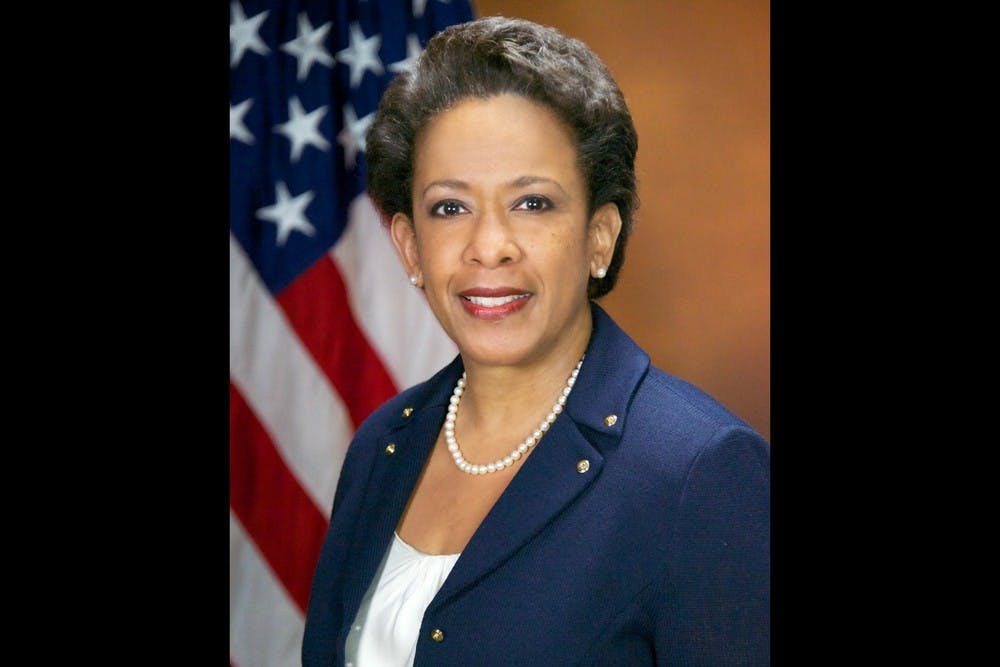Loretta Lynch, former attorney general of the United States, addressed Duke University School of Law graduates Saturday at its 2017 hooding ceremony.
She spoke for 20 minutes, joking—in reference to her approximately five-feet-tall physical stature—that “of course we all know the saying that the best commencement address is like the best commencement speaker: short!” Lynch told the graduates that reaching the office of attorney general was not always something she thought would be in her future.
“When I was sitting where you are, 'attorney general' was probably right above 'point guard for the Blue Devils' in what I thought I could do!" Lynch said to laughter from the audience. "But I also want to tell you that you don’t have to become the attorney general to leave that mark. It is not the title on your door, it is the passion in your heart."
Lynch grew up in Durham, and both her parents still live and work in the community. Her father is a pastor and her mother is a public school librarian. Her brother received his Master of Divinity degree from Duke.
Lynch graduated from Durham High School before going on to receive her undergraduate and law degrees from Harvard University. Nominated by then-President Barack Obama, she was confirmed by the U.S. Senate in 2015 and served for two years before President Donald Trump took office in January. Lynch was the first African American female to hold the position of attorney general.
Lynch will be one of seven to receive an honorary degree from Duke at tomorrow’s commencement.
She said she was proud that Duke's Juris Doctor students have already completed 50 hours of pro bono work through the degree, adding that in law school “we study law in the abstract."
"Law school is a wonderful education. But one of the unintended consequences of the way in which we study law, the way in which we focus on the precursors of law, is that it can make the law look frozen at times—it can make it look static, at times," she noted.
Lynch said this view of the law can lead law school graduates, including herself, to wonder if there is anything important left to do as a lawyer. She urged graduates to consider their privilege and asked them to be guided by one question: “What is my responsibility to those who I may never know?”
“When I sat where you are today, I have to tell you I never dreamed of the opportunities I was going to have—to play even a small role in big decisions. I never imagined that I would be a part of a case that would send a clear message that police officers are not above the law," she said. "When I sat where you are today, I never imagined that I would be able to play a role in extending the protection of the law to our LGBTQ Americans, friends, brothers and sisters, or mending the relationship between law enforcement and the communities we serve. I never imagined those things when I was in your chair. But to be able to do them has been the honor, and in fact the joy, of my life.”
Lynch gave the audience a glimpse into her ideas of the most serious legal problems facing the United States.
“Too many of our fellow citizens still live in fear of law enforcement and those who seek to protect and serve," she said. "In a country founded on equal justice under the law, too many Americans are literally priced out of the courtroom: they cannot afford to vindicate their basic rights."
The former Attorney General also made note of a topic that has been relevant in North Carolina recently—voting rights. She called new barriers to voting "an emblem of national shame."
Lynch alluded to the political—though she did not mention Donald Trump or her successor, Jeff Sessions, by name.
“We’ve all seen the recent rise in nationalism in so many parts of the world," Lynch said. "Too many people feel there’s a wall there between them and that progress, and that they have nowhere to turn for redress.”
Lynch encouraged the graduates to try to bridge the divides in America, particularly between those with higher education and those “who have no one beside them in the halls of justice.”
“As a result of all of these challenges and so many more, we see growing divides in our country—between the coast and the heartland, between the cities and rural communities, between those with higher education and those without,” Lynch said.
Despite the challenges, Lynch sounded optimistic about the future of the world and the field of law.
"There is no better time! There is no greater need than right now," she said. "There’s no better time to be alive. There’s no better time to be a lawyer than right now.”
Get The Chronicle straight to your inbox
Signup for our weekly newsletter. Cancel at any time.

